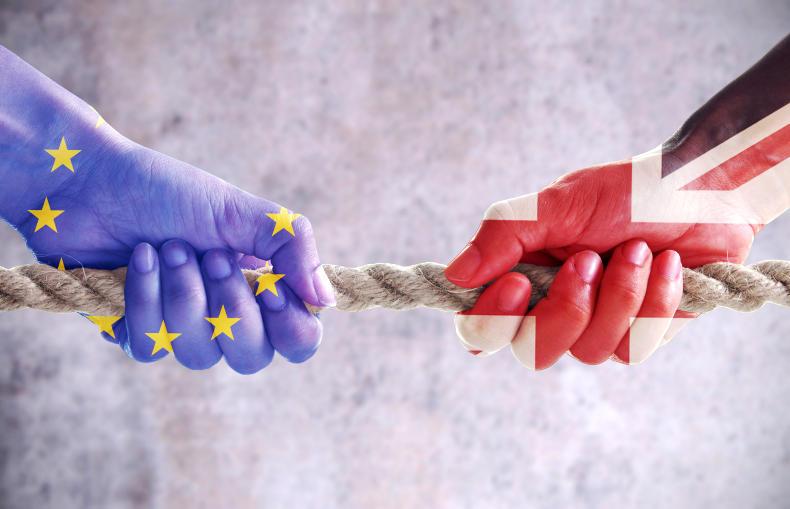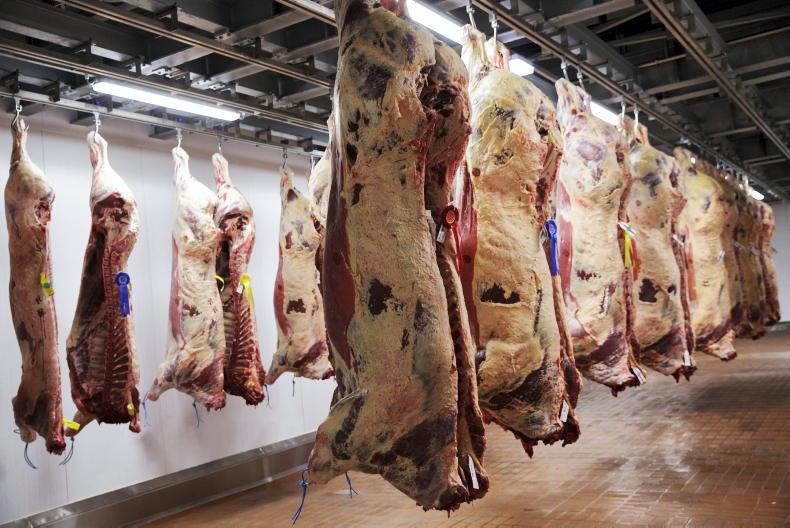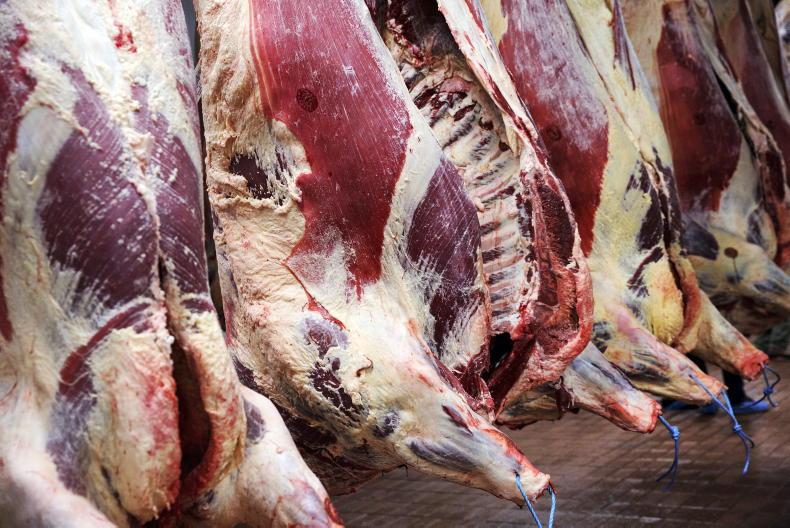The EU and UK held a second round of talks this week by video conference and mapped out a schedule for further discussions this month and next month.
There had been hopes that the economic catastrophe that the International Monetary Fund (IMF) is forecasting to follow COVID-19 would mellow the enthusiasm in the UK for significant divergence from the EU but briefings from the UK Government, endorsed by Brexit negotiator David Frost, suggest otherwise.
The UK’s chief negotiator said explicitly in a tweet that “Transition ends on 31 December this year. We will not ask to extend it. If the EU asks we will say no.”
The UK position is that in the aftermath of COVID-19, the UK wants full flexibility to chart its own course rather than be entwined in an EU-wide response in 2021 and 2022.
It is difficult to see if an agreement can be cobbled together over the next few weeks, with June designated as the deadline when the parties would review where the end point is going to be. As it stands, it looks ominous for Irish farmers.
COVID-19 impact
Agriculture, like all other sectors of the Irish economy, is suffering and is going to suffer further as a result of COVID-19.
Even as commerce begins the process of returning to normal, restrictions on social gatherings are likely to continue for a prolonged period. This means that the very important restaurant sector, especially important for steak meat, won’t be operational as it was pre-COVID-19 for several months.
Even then it is likely that some will have gone out of business. The IMF forecasts an economic hit across Europe between 6% and 9% in Ireland’s main export markets, comparable with the great depression of the 1930s.
Inevitably this will hit disposable income and discretionary spending like choosing steak in a quality restaurant will be one of the first areas to reflect this.
As well as hitting the more expensive beef cuts, sheep meat is also vulnerable because it is widely used in restaurants and is also one of the most expensive meats.
Brexit will add to COVID-19 impact
Add to this the real possibility of trade between the UK and EU being on WTO terms and there is a bureaucratic and tariff nightmare facing Irish exporters to the UK from the start of next year. Dealing with either a WTO terms (no-deal) Brexit or COVID-19 would be a nightmare but attempting to deal with both at the same time is unimaginable.
Aside from the increasingly strained relationship between the UK and EU, there is also tension within the EU. There were already difficulties getting a budget agreed before COVID-19 was an issue, revealed in the all-night discussion at the end of February that only served to reflect the gap between member nations. This was again reflected in more recent discussions about dealing with the COVID-19 aftermath. The stronger EU economies fear being dragged down by the weaker ones.
Commission President’s appeal
Speaking to the EU Parliament on Thursday, Commission President Ursula von der Leyen called for an EU Marshall plan to reboot the economy in countries ravaged by COVID-19. The original Marshall plan was the US-funded rebuilding of Western Europe in the aftermath of WW2.
The President told the Parliament that “there is only one instrument we have that is trusted by all member states, which is already in place and can deliver quickly – the European budget, the mothership of our recovery”.
EU budget problem
The European Parliament traditionally wanted an increased EU budget and had proposed 1.3% contributions of gross national incomes (GNI) by member states. However, it is ultimately the heads of state in the EU Council that decide the proportion of national income that will be contributed.
This is fixed on a percentage of members' GDP and at the February budget meeting, there was a gap between the Commission’s proposal of 1.14% of GNI and the maximum 1.0% Sweden, Austria, the Netherlands and Denmark were prepared to pay.
What’s more, the value of this percentage of GNI will decline as member state economies inevitably shrink in the aftermath of COVID-19.
Recession
As of now, it looks like the worst global recession since the 1930s as forecast by the IMF will coincide with the return of trade barriers between the EU and UK as well as disunited EU that needs to reboot the economies of its members but doesn’t appear to have the political consensus to do so.
Irish farmers are already at a 10-year low for beef prices at this time of year and milk prices have also fallen. The economic aftermath of COVID-19 was always going to have a brutal impact on farmers but no deal between the EU and UK on a trading relationship for next year will make it even worse.
Read more
EU not keeping up with COVID-19
The EU and UK held a second round of talks this week by video conference and mapped out a schedule for further discussions this month and next month.
There had been hopes that the economic catastrophe that the International Monetary Fund (IMF) is forecasting to follow COVID-19 would mellow the enthusiasm in the UK for significant divergence from the EU but briefings from the UK Government, endorsed by Brexit negotiator David Frost, suggest otherwise.
The UK’s chief negotiator said explicitly in a tweet that “Transition ends on 31 December this year. We will not ask to extend it. If the EU asks we will say no.”
The UK position is that in the aftermath of COVID-19, the UK wants full flexibility to chart its own course rather than be entwined in an EU-wide response in 2021 and 2022.
It is difficult to see if an agreement can be cobbled together over the next few weeks, with June designated as the deadline when the parties would review where the end point is going to be. As it stands, it looks ominous for Irish farmers.
COVID-19 impact
Agriculture, like all other sectors of the Irish economy, is suffering and is going to suffer further as a result of COVID-19.
Even as commerce begins the process of returning to normal, restrictions on social gatherings are likely to continue for a prolonged period. This means that the very important restaurant sector, especially important for steak meat, won’t be operational as it was pre-COVID-19 for several months.
Even then it is likely that some will have gone out of business. The IMF forecasts an economic hit across Europe between 6% and 9% in Ireland’s main export markets, comparable with the great depression of the 1930s.
Inevitably this will hit disposable income and discretionary spending like choosing steak in a quality restaurant will be one of the first areas to reflect this.
As well as hitting the more expensive beef cuts, sheep meat is also vulnerable because it is widely used in restaurants and is also one of the most expensive meats.
Brexit will add to COVID-19 impact
Add to this the real possibility of trade between the UK and EU being on WTO terms and there is a bureaucratic and tariff nightmare facing Irish exporters to the UK from the start of next year. Dealing with either a WTO terms (no-deal) Brexit or COVID-19 would be a nightmare but attempting to deal with both at the same time is unimaginable.
Aside from the increasingly strained relationship between the UK and EU, there is also tension within the EU. There were already difficulties getting a budget agreed before COVID-19 was an issue, revealed in the all-night discussion at the end of February that only served to reflect the gap between member nations. This was again reflected in more recent discussions about dealing with the COVID-19 aftermath. The stronger EU economies fear being dragged down by the weaker ones.
Commission President’s appeal
Speaking to the EU Parliament on Thursday, Commission President Ursula von der Leyen called for an EU Marshall plan to reboot the economy in countries ravaged by COVID-19. The original Marshall plan was the US-funded rebuilding of Western Europe in the aftermath of WW2.
The President told the Parliament that “there is only one instrument we have that is trusted by all member states, which is already in place and can deliver quickly – the European budget, the mothership of our recovery”.
EU budget problem
The European Parliament traditionally wanted an increased EU budget and had proposed 1.3% contributions of gross national incomes (GNI) by member states. However, it is ultimately the heads of state in the EU Council that decide the proportion of national income that will be contributed.
This is fixed on a percentage of members' GDP and at the February budget meeting, there was a gap between the Commission’s proposal of 1.14% of GNI and the maximum 1.0% Sweden, Austria, the Netherlands and Denmark were prepared to pay.
What’s more, the value of this percentage of GNI will decline as member state economies inevitably shrink in the aftermath of COVID-19.
Recession
As of now, it looks like the worst global recession since the 1930s as forecast by the IMF will coincide with the return of trade barriers between the EU and UK as well as disunited EU that needs to reboot the economies of its members but doesn’t appear to have the political consensus to do so.
Irish farmers are already at a 10-year low for beef prices at this time of year and milk prices have also fallen. The economic aftermath of COVID-19 was always going to have a brutal impact on farmers but no deal between the EU and UK on a trading relationship for next year will make it even worse.
Read more
EU not keeping up with COVID-19









SHARING OPTIONS